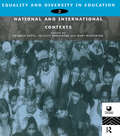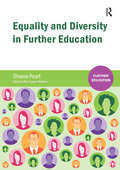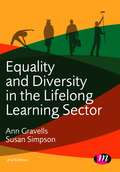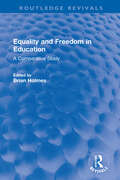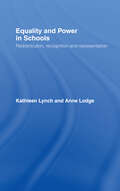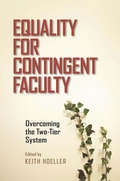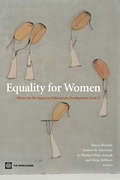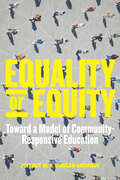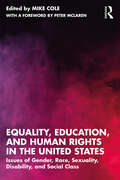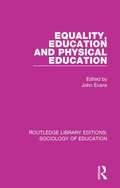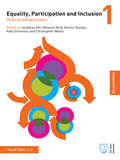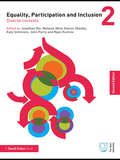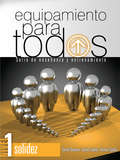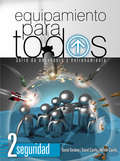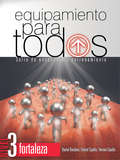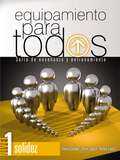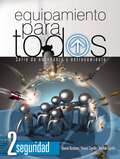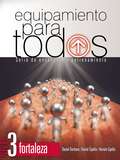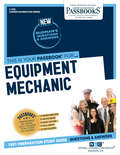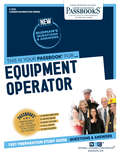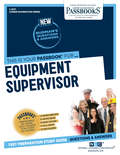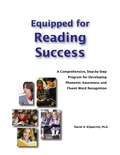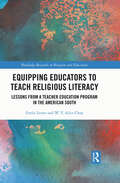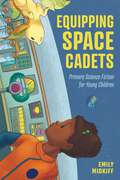- Table View
- List View
Equality and Diversity in Education 2: National and International Contexts for Practice and Research (Developing Inclusive Curricula: Equality and Diversity in Education)
by Felicity Armstrong Patricia Potts Mary MastertonLike the first reader, this collection examines the grounds which are accepted for inclusion or exclusion of students, and looks at how appropriate support can be guaranteed for people who experience difficulties in learning, who are disabled or who experience social or other kinds of disability. This volume explores national and international contexts for educational practice and research and discusses practical, ethical and political issues which are relevant to undertaking that research. Part one covers issues facing local government and the consumers of educational services in the UK. Part two compares policy and practice in eleven different countries and part 3 discusses research which explores the issues of equality and diversity in education. This volume and her sister, Equality and Diversity in Education 1: Learning, Teaching and Managing in Schools are reraders for the Open University course, "Developing Inclusive Curricula: Equality and Diversity in Education" (E829). The two books in the series will appeal to teachers, non-teaching assistants and other school-based staff,parents,disabled people and those who have experienced difficulties in learning,social and health workers, and those working for voluntary organisations.
Equality and Diversity in Further Education (Further Education)
by Sheine PeartFurther Education is the most diverse of all the education sectors. Managing diversity and promoting equality, a legislative requirement of the 2010 Equalities Act, brings significant challenges for practitioners who are tasked with making the rhetoric of politicians a reality, often with little guidance and few resources. This book provides practical guidance for existing lecturers and trainee teachers, explaining how they can overcome these challenges and establish a positive learning environment to meet the needs of all learners.This accessible and up to date book extends the scope of the diversity and inclusion debate to consider a wide range of issues including age, working with cross-cultural groups, promoting effective gender relations, sexual orientation and working with current and ex-offenders. Each chapter includes clear objectives, case studies, critical thinking tasks, chapter reflections and a learning review audit.
Equality and Diversity in the Lifelong Learning Sector (Further Education and Skills)
by Ann Gravells Susan SimpsonWritten for students of the Certificate and the Diploma in Teaching in the Lifelong Learning Sector (CTLLS and DTLLS), this title is a comprehensive course book for the popular optional unit Equality and Diversity in the Lifelong Learning Sector. It is relevant for all students, whatever their awarding organisation and whether they are taking the unit at level 3 or level 4. All Chapters are linked to the QTLS standards and provide comprehensive coverage, closely following the content of the unit, while examples and activities are included to ehnache learning. This second edition now includes 'Extension Activities' specifically for level 4 students and has been updated following the Equality Act 2010. This title will help anyone teaching in a veriety of Lifelong Learning settings and can also be used when providing in-service CPD training for staff.
Equality and Freedom in Education: A Comparative Study (Routledge Revivals)
by Brian HolmesFirst published in 1985, Equality and Freedom in Education investigates the extent to which it is possible or desirable to provide equal opportunities in education, regardless of age sex, race, language, and social class. Attempts to make such provision regularly attract the criticism that they remove the freedom of parents and religious bodies to educate children in accordance with their particular wishes. To understand this dilemma, the book analyses the educational systems and practices in England and Wales, France, the USA, the USSR, China and Japan. Information about each system is provided in accordance with a taxonomy, developed by Professor Holmes for the International Bureau of Education in Geneva, and widely accepted by Ministries of Education throughout the world. Simplified diagrams show how school systems are organised and how children pass through the school system, and essential statistical information, taken from UNESCO sources, is also provided. The book will be of interest to students of education and sociology.
Equality and Power in Schools: Redistribution, Recognition and Representation
by Kathleen Lynch Anne LodgeBased on a study of 12 schools over a two-year period, this book explores issues of equality and power both in the classroom and in the staffroom. Through classroom observation, interviews with pupils and staff, focus groups and questionnaires, the authors examine classroom practice, grouping and streaming, peer group relations and attitudes to power relationships both between pupils and teachers, and amongst teachers themselves. They also look particularly at the different experiences of pupils in single sex and co-educational schools.The authors' findings offer an insight into the way schools operate in terms of social class, gender, religion and ethnicity, and raise fundamental questions about the use and abuse of power in schools and how this affects the lives of pupils and staff.This book will be of interest to those studying education, sociology, gender studies and women's studies, and to policy makers and teachers in senior management roles.
Equality for Contingent Faculty: Overcoming the Two-Tier System
by Keith HoellerVice President Joseph Biden has blamed tuition increases on the high salaries of college professors, seemingly unaware of the fact that there are now over one million faculty who earn poverty-level wages teaching off the tenure track. The Chronicle of Higher Education ran a story entitled "From Graduate School to Welfare: The PhD Now Comes with Food Stamps." Today three-fourths of all faculty are characterized as "contingent instructional staff," a nearly tenfold increase from 1975.Equality for Contingent Faculty brings together eleven activists from the United States and Canada to describe the problem, share case histories, and offer concrete solutions. The book begins with three accounts of successful organizing efforts within the two-track system. The second part describes how the two-track system divides the faculty into haves and have-nots and leaves the majority without the benefit of academic freedom or the support of their institutions. The third part offers roadmaps for overcoming the deficiencies of the two-track system and providing equality for all professors, regardless of status or rank.
Equality for Contingent Faculty: Overcoming the Two-Tier System
by Keith HoellerVice President Joseph Biden has blamed tuition increases on the high salaries of college professors, seemingly unaware of the fact that there are now over one million faculty who earn poverty-level wages teaching off the tenure track. The Chronicle of Higher Education ran a story entitled "From Graduate School to Welfare: The PhD Now Comes with Food Stamps." Today three-fourths of all faculty are characterized as "contingent instructional staff," a nearly tenfold increase from 1975. Equality for Contingent Faculty brings together eleven activists from the United States and Canada to describe the problem, share case histories, and offer concrete solutions. The book begins with three accounts of successful organizing efforts within the two-track system. The second part describes how the two-track system divides the faculty into haves and have-nots and leaves the majority without the benefit of academic freedom or the support of their institutions. The third part offers roadmaps for overcoming the deficiencies of the two-track system and providing equality for all professors, regardless of status or rank.
Equality for Women: Where Do We Stand?
by Andrew R. Morrison Mirja Sjöblom A. Waafas Ofosu-Amaah Mayra BuvinicUpon signing the Millennium Declaration in 2000, the international community committed itself to eight development goals with timebound targets and measurable indicators. The third of these eight goals was to 'promote gender equality and empower women'. The third Millennium Development Goal (MDG3) in the Millennium Declaration has spurred national and international efforts to improve women's situation around the globe. 'Equality for Women: Where Do We Stand on Millennium Goal 3?' tracks countries' progress with implementing and financing MDG3 by examining national experiences and successes with policies and programs. It also contains an assessment of the effectiveness of different strategies in achieving MDG3 and the financial requirements needed to attain MDG3 by 2015. 'Equality for Women' will be useful for gender analysts, policy makers, government officials, and others working to promote gender mainstreaming.
Equality or Equity: Toward a Model of Community-Responsive Education (Race and Education)
by Jeffrey M. Duncan-AndradeEquality or Equity sets forth a compelling argument urging us to shift our understanding of the role of our education system from providing equal opportunity to building an equitable society.A leading scholar-practitioner and ardent proponent of culturally responsive forms of education, Jeffrey M. R. Duncan-Andrade aims to settle the debates over whether we should work toward a public education system built on the goal of equality, in which identical resources are provided for all students, or equity, in which different resources are offered in response to differences in student interests and needs. Duncan-Andrade centers his argument on the importance of creating meaningful education experiences for all students, particularly for low-income students of color and immigrant students, who have gained relatively fewer benefits from decades of equality-focused education reform.Drawing on research from across a range of disciplines, including neuroscience, social epidemiology, public health, and social work, Duncan-Andrade introduces three essential domains of a pedagogy that are both culturally and community responsive: relationships, relevance, and responsibility. He enlists the voices of practitioners to provide grounded examples of what community-responsive pedagogy looks like in each of these domains. These examples demonstrate how equitable classroom practices can enrich student engagement, enhance trauma responsiveness, and improve educational outcomes.Equality or Equity makes an urgent appeal for designing and implementing a truly equitable school system and shows us how we can begin to accomplish that goal.
Equality, Education, and Human Rights in the United States: Issues of Gender, Race, Sexuality, Disability, and Social Class
by Mike ColeThis book offers an uncompromising and rigorous analysis of education and human rights by examining issues related to gender, race, sexuality, disability, and social class. Written as a companion to the very successful U.K. version, this volume reflects the economic, political, social, and cultural changes in educational and political policy and practice in the United States. Offering a comprehensive look at these areas, this book is an essential resource across a wide range of disciplines and for all those interested in education, social policy, and equality.
Equality, Education, and Physical Education (Routledge Library Editions: Sociology of Education #21)
by John EvansIn this book, first published in 1993, John Evans presents a guideline for challenging sexism, racism and elitism in programmes of physical education. Physical education in relation to social class, gender, race and disability is also discussed. The results arising show problems in the teaching of physical education, and examines the importance of physical education in the development of the child in today's educational system. It is the intention of the contributors to help practitioners clarify their thinking on concepts and issues involved in effecting equal opportunities in physical education. In turn, it is hoped that this will lead to better formation of physical education programmes which demonstrate both equality and equity. This title will be of interest not only to teachers but to students of sociology and education.
Equality, Participation and Inclusion 1: Diverse Perspectives
by Katy Simmons Kieron Sheehy Melanie Nind Jon Rix Christopher WalshWhat are the experiences of children and young people? How can we think about the challenges they face? What systems and practices can support them? How can we develop greater equality, participation and inclusion across diverse settings? This second edition of Equality, Participation and Inclusion 1: Diverse Perspectives is the first of two Readers aimed at people with an interest in issues of equality, participation and inclusion for children and young people. This first Reader focuses in particular on the diverse perspectives held by different practitioners and stakeholders. Comprising readings taken from the latest research in journal articles, newly commissioned chapters, as well as several chapters from the first edition that retain particular relevance, this fully updated second edition has broadened its focus to consider a greater diversity of perspectives. Whilst exploring how we think about the experiences of children and young people across a range of contexts it maintains a subtle, underlying emphasis upon education and the experiences of disabled people. Drawing on the writing of academics, practitioners, children and young people, and people who have experienced exclusion, this book is a rich resource for students and practitioners who are interested in thinking about how inequality and exclusion are experienced, and how they can be challenged. Much of the material reflects on lived experiences and life stories, and will be of particular interest to those working in education, health, youth and community work, youth justice and social services, as well as to families and advocates.
Equality, Participation and Inclusion 2: Diverse Contexts
by Jonathan Rix Katy Simmons Kieron Sheehy John Parry Melanie Nind Rajni KumraiWhat are the experiences of children and young people? How can we think about the challenges they face? What systems and practices can support them? How can we develop greater equality, participation and inclusion across diverse settings? This second edition of Equality, Participation and Inclusion 2: Diverse Contexts is the second of two Readers aimed at people with an interest in issues of equality, participation and inclusion for children and young people. This second Reader focuses in particular upon the diverse experiences and contexts in which children and young people encounter issues of equality, participation and inclusion. Comprising readings taken from the latest research in journal articles, newly commissioned chapters, as well as several chapters from the first edition that retain particular relevance, this fully updated second edition has broadened its focus to consider a wider range of diverse experiences and contexts, whilst maintaining an emphasis on educational settings. Drawing on the writing of academics, practitioners, children and young people, this collection is a rich source of information and ideas for students and practitioners who are interested in thinking about how inequality and exclusion are experienced, and how they can be challenged, and will be of particular interest to those working in education, health, youth and community work, youth justice and social services. Families and advocates are also likely to be drawn to the material as much of it reflects on lived experiences and life stories.
Equipamiento para todos - Nivel 1: Serie de enseñanza y equipamiento
by Daniel Dardano Daniel Cipolla Hernán CipollaCuando un creyente se dispone a estudiar la Biblia, suele recurrir a comentarios bíblicos, con la finalidad de comprender adecuadamente las verdades divinas. Esta serie de enseñanza aunque podría ser considerada como "un lilbro de estudio bíblico", no es exactamente eso. Equipamiento para todos tiene el objetivo de que cada creyente sea transformado por la vida de Cristo que habita en él. Este es el primer libro de la serie de enseñanza, el cual contribuye a la solidez de los creyentes a través de temas como: - Un discípulo según Jesucristo - Expresiones de una vida superior - Lo consagrado al Señor - Quién es el mayor según Jesús El estudio de los escritos bíblicos siempre ha sido importante para la Iglesia. De hecho, desde sus comienzos los creyentes perseveraron en aprender las Escrituras con diligencia y dedicación. Además el Nuevo Testamento refleja la constante labor de los apóstoles, quienes se ocuparon de que las futuras generaciones recibieran un legado doctrinal caracterizado por la solidez. El conocimiento intelectual de las verdades de Dios, nunca será suficiente y no debe ser la meta del creyente. El objetivo del Señor es que cada uno de sus hijos experimente y viva en plenitud lo revelado en la Palabra. Cuando esto ocurre, los demás pueden comprobar que esas verdades son efectivas en la vida diaria. Este libro es un recurso valioso y los principios desarrollados en su contenido tienen el poder de transformar tu vida.
Equipamiento para todos - Nivel 2: Serie de enseñanza y entrenamiento
by Daniel Dardano Daniel Cipolla Hernán CipollaLas palabras tienen un alcance mayor al que la gente les da. Muchas veces se analizan con una mirada superficial o de acuerdo a conceptos contemporáneos que difieren mucho de su sentido verdadero. Cuando esto ocurre, se pierde el significado original y la dimensión de las palabras. Algunos pocos ejemplos lo demuestran, Iglesia, es una palabra que se suele usar para referrirse a toda clase de sistema religioso que dictamina las reglas de vida que las personas deben seguir. Reino, es una palabra que se suele asociar a la grandeza de un monarca, quien se lo considera casi como el dueño del país al que representa. Autoridad, es una palabra que se relaciona con orden y justicia, o abuso y corrupción. En distintas épocas palabras como iglesia, reino y autoridad han sido interpretadas de maneras tan variadas, que hasta han sidfo despojadas de su significado real. En la actualidad, ¿cómo interpretan los cristianos estas palabras? ¿Las comprenden desde un punto de vista cultural, religioso, tradicional o popular? Sin duda, hay una sola manera de percibir estas palabras y lo que ellas representan en la dimensión correcta, y los creyentes tienen el privilegio de verlas como Dios las ve.Iglesia, Reino y autoridad, son los tres grandes temas tratados en Equipamiento para todos, Nivel 2. Seguridad. Independientemente de los conceptos que se defendieron en el pasado, llegó el tiempo de que se establezca lo que Dios dice acerca de estos temas de tanta relevancia. Este libro presenta una perspectiva espiritual reveladora que elevará tu mirada. Ver la Iglesia, el Reino y la autoridad como el Señor los ve, traerá seguridad a tu vida.
Equipamiento para todos - Nivel 3: Serie de enseñanza y entrenamiento
by Daniel Dardano Daniel Cipolla Hernán CipollaUna persona débil físicamente tiene un mayor riesgo de contraer enfermedades. En cambio, un organismo saludable tiene una fortaleza que refleja su vitalidad interior. De la misma manera, los creyentes en Cristo pueden estar débiles espiritualmente o mostrar una fortaleza interior que los hace altamente resistentes. ¿De dónde nace la fortaleza espiritual? Sin dudas, de la presencia del Espíritu Santo en cada cristiano. En una vida llena del Espíritu no puede dominar ningún conflicto espiritual, como tampoco el pecado o la influencia del diablo. En realidad, la plenitud del Espíritu manifiesta la victoria en todas las áreas. Además, evidencia el poder sobrenatural para hacer las obras que Dios preparó para sus hijos que, según Jesús lo expresó, en muchos casos serían mayores a las que Él mismo realizó. Todo esto proviene de la fortaleza del Espíritu Santo en el creyente. Este libro es sobre el Espíritu Santo. Sin embargo, ¿es posible enseñar algo nuevo acerca del Espíritu que no se haya dicho aún? Verás que siempre hay más del Espíritu Santo que es posible aprender. Pero sobre todas las cosas, percibirás que la fortaleza de los hijos de Dios proviene del Espíritu Santo. Este libro tiene el objetivo de presentar la centralidad del Espíritu Santo en la vida del creyente y de la Iglesia.
Equipamiento para todos – Nivel 1 Solidez: Serie de enseñanza y entrenamiento
by Daniel DardanoCuando un creyente se dispone a estudiar la Biblia, suele recurrir a comentarios bíblicos, con la finalidad de comprender adecuadamente las verdades divinas. Esta serie de enseñanza y entrenamiento, aunque podría ser considerada como de estudio bíblico, no es exactamente eso.Equipamiento para todos tiene el objetivo de que cada creyente sea transformado por la vida de Cristo que habita en él.Éste es el primer libro de la serie de enseñanza y entrenamiento, el cual contribuye a la solidez de los creyentes a través de temas como:Un discípulo según JesucristoExpresiones de una vida superiorLo consagrado al SeñorQuién es el mayor según JesúsEl estudio de los escritos bíblicos siempre ha sido importante para la Iglesia. De hecho, desde sus comienzos los creyentes perseveraron en aprender las Escrituras con diligencia y dedicación. Además, el Nuevo Testamento refleja la constante labor de los apóstoles, quienes se ocuparon de que las futuras generaciones recibieran un legado doctrinal caracterizado por la solidez.El conocimiento intelectual de las verdades de Dios nunca será suficiente y no debe ser la meta del creyente. El objetivo del Señor es que cada uno de sus hijos experimente y viva en plenitud lo revelado en la Palabra. Cuando esto ocurre, los demás pueden comprobar que esas verdades son efectivas en la vida diaria.Este libro es un recurso valioso y los principios desarrollados en su contenido tienen el poder de transformar tu vida. Equipping for Everyone – Level 1 Solidity When a believer sets out to study the Bible, he or she often turns to a Bible commentary or a theology manual. However, even if it seems that this series of teachings is just that, it is not so. Equipping for Everyone is designed to help each believer to be transformed by the life of Christ that dwells within them. This is the first book in a series of teachings that seeks to strengthen the believer through topics such as:A disciple according to Jesus ChristSigns of a superior lifeWhat is consecrated to the LordWho is the greatest according to JesusThe study of the biblical text has always been important for the Church. In fact, from the Church&’s conception the believers have persevered in studying the Scriptures with diligence and dedication. In addition, the New Testament reflects the constant work of the apostles, who sought to provide for future generations a legacy characterized by its solidity.It will never be sufficient to know the truths of God intellectually, and this should not be a believer's objective in studying the Scriptures. On the contrary, it is the Lord's will that each one of His children experience and live out the fullness of the truths revealed in the Word. When this happens, others will see that these truths have become part of the believer&’s everyday life. This book is a valuable resource, teaching principles that have the power to transform your life.
Equipamiento para todos – Nivel 2 Seguridad: Serie de enseñanza y entrenamiento
by Daniel Dardano Daniel Cipolla Hernán CipollaTodas las palabras tienen un significado que las define. Sin embargo, suelen estar sujetas a la interpretación de las personas. Cuando se las analiza de manera superficial o se las adapta a conceptos contemporáneos y culturales, corren el riesgo de perder su sentido original y su dimensión. Algunos pocos ejemplos lo demuestran. Iglesia es una palabra que se suele usar para referirse a toda clase de sistema religioso que dictamina las reglas de vida que las personas deben seguir. Reino es una palabra que se suele asociar a la grandeza de un monarca, a quien se lo considera casi como el dueño del país al que representa. Autoridad es una palabra que se relaciona con orden y justicia, o abuso y corrupción. El hecho es que estas tres palabras se interpretaron de maneras tan variadas según la época, que muchas veces su significado real se tergiversó.En la actualidad, ¿cómo interpretan los cristianos las palabras iglesia, reino y autoridad? ¿Las comprenden desde un punto de vista cultural, religioso, tradicional o popular? Sin duda, la única manera de percibir estas palabras y lo que ellas representan en la dimensión correcta es verlas como Dios las ve; y los creyentes tienen ese privilegio.Iglesia, Reino y autoridad, son los tres grandes temas tratados en Equipamiento para todos, Nivel 2, Seguridad. Independientemente de los conceptos erróneos que hayan existido, es imprescindible establecer lo que Dios dice acerca de estos temas de tanta relevancia.Este libro presenta una perspectiva espiritual reveladora que elevará tu mirada. Ver la Iglesia, el Reino y la autoridad como el Señor lo hace, traerá seguridad a tu vida.Equipping for Everyone – Level 2 SecurityAll words have a meaning that defines them. However, they are often subject to people's interpretation. When they are superficially analyzed or adapted to contemporary and cultural concepts, they run the risk of losing their original meaning and dimension. A few examples prove it. Church is a word that is often used to refer to all kinds of religious system that dictates the rules of life that people must follow. Kingdom is a word that is usually associated with the greatness of a monarch, who is considered almost as the owner of the country he represents. Authority is a word that relates to order and justice, or abuse and corruption. The fact is that these three words were interpreted in such varied ways according to the time, that many times their real meaning was misrepresented.Today, how do Christians interpret the words church, kingdom, and authority? Do they understand them from a cultural, religious, traditional, or popular point of view? Without a doubt, the only way to perceive these words and what they represent in the correct dimension is to see them as God sees them; and believers have that privilege.Church, Kingdom, and authority are the three main topics covered in Equipment for all, Level 2, Security. Regardless of the misconceptions that may have existed, it is imperative to establish what God says about these important issues.This book presents an eye-opening spiritual perspective that will lift your gaze. Seeing the Church, the Kingdom and authority as the Lord does, will bring security to your life.
Equipamiento para todos – Nivel 3 Fortaleza: Serie de enseñanza y entrenamiento
by Daniel Dardano Daniel Cipolla Hernán CipollaUna persona débil físicamente tiene un mayor riesgo de contraer enfermedades. En cambio, un organismo saludable tiene una fortaleza que refleja su vitalidad interior.De la misma manera, los creyentes en Cristo pueden estar débiles espiritualmente o mostrar una fortaleza interior que los hace altamente resistentes. ¿De dónde nace la fortaleza espiritual? Sin dudas, de la presencia del Espíritu Santo en cada cristiano.En una vida llena del Espíritu no puede prosperar ningún conflicto espiritual, como tampoco el pecado o la influencia del diablo. En realidad, la plenitud del Espíritu manifiesta la victoria en todas las áreas. Además, evidencia el poder sobrenatural para hacer las obras que Dios preparó para sus hijos que, según Jesús lo expresó, en muchos casos serían mayores a las que Él mismo realizó. Todo esto proviene de la fortaleza del Espíritu Santo en el creyente.Este libro es sobre el Espíritu Santo. Sin embargo, ¿es posible enseñar algo nuevo acerca del Espíritu que no se haya dicho aún? Verás que siempre hay más del Espíritu Santo que es posible aprender. Pero sobre todas las cosas, percibirás que la fortaleza de los hijos de Dios proviene del Espíritu Santo.Este libro tiene el objetivo de presentar la centralidad del Espíritu Santo en la vida del creyente y de la Iglesia.Equipping for Everyone – Level 3 StrengthA physically weak person has a higher risk of contracting diseases. In contrast, a healthy body has a strength that reflects its inner vitality.In the same way, believers in Christ can be spiritually weak or show an inner strength that makes them highly resistant. Where does spiritual strength come from? Undoubtedly, of the presence of the Holy Spirit in each Christian.In a Spirit-filled life, no spiritual conflict can flourish, nor can sin or the influence of the devil. In reality, the fullness of the Spirit manifests victory in all areas. In addition, it evidences the supernatural power to do the works that God prepared for his children, which, according to Jesus expressed it, in many cases would be greater than those that He himself performed. All of this comes from the strength of the Holy Spirit in the believer.This book is about the Holy Spirit. However, is it possible to teach something new about the Spirit that has not yet been said? You will see that there is always more of the Holy Spirit that is possible to learn. But above all things, you will perceive that the strength of God's children comes from the Holy Spirit.This book has the objective of presenting the centrality of the Holy Spirit in the life of the believer and of the Church.
Equipment Mechanic: Passbooks Study Guide (Career Examination Series #C-1608)
by National Learning CorporationThe Equipment Mechanic Passbook® prepares you for your test by allowing you to take practice exams in the subjects you need to study. It provides hundreds of questions and answers in the areas that will likely be covered on your upcoming exam, including but not limited to: mechanical components and principles; electrical theory and cooling and heating systems; test, diagnose, and repair vehicle electric systems and accessories; components of combustion engines; vehicle and equipment operation and components; and more.
Equipment Operator: Passbooks Study Guide (Career Examination Series)
by National Learning CorporationThe Equipment Operator Passbook® prepares you for your test by allowing you to take practice exams in the subjects you need to study. It provides hundreds of questions and answers in the areas that will likely be covered on your upcoming exam, including but not limited to: operation and maintenance of heavy equipment; tools and their uses; arithmetical computation and reasoning; and other related areas.
Equipment Supervisor: Passbooks Study Guide (Career Examination Series #C-3546-9)
by National Learning CorporationThe Equipment Supervisor Passbook® prepares you for your test by allowing you to take practice exams in the subjects you need to study. It provides hundreds of questions and answers in the areas that will likely be covered on your upcoming exam, including but not limited to: highways, drainage facilities, related structures, and snow and ice control; operation and preventative maintenance of automobiles, trucks and heavy equipment; safety practices; supervision; mechanical devices and tools used in maintenance work; and other related areas.
Equipped For Reading Success: A Comprehensive, Step-by-step Program For Developing Phonemic Awareness And Fluent Word Recognition
by David KilpatrickMore than an explanation of current research, Equipped for Reading Success is a complete program for training phonemic awareness. Research has shown that contrary to our intuitions, phonemic awareness is important for remembering the words we read (sight-word recognition), not just for developing phonic decoding skills. Equipped for Reading Success uses a developmentally appropriate approach designed to boost phonemic awareness, phonics, and instant word recognition. It also gives teachers concrete tools to help children develop a large sight vocabulary and is designed to supplement any existing reading program or approach. Implementing the program requires minimal planning and only several minutes of supplemental instruction per day.
Equipping Educators to Teach Religious Literacy: Lessons from a Teacher Education Program in the American South (Routledge Research in Religion and Education)
by Emile Lester W. Y. ChanThis volume provides a detailed evaluation of a unique education program implemented in secondary schools in Georgia to enhance teachers’ religious literacy and their ability to promote this in schools and classrooms. The text demonstrates that religious literacy can be proactively taught to students, whilst also highlighting key considerations and tensions around religious liberty in the American South. Spanning rural, urban, and suburban Georgia, the text presents an original approach to the growing field of religious literacy by foregrounding community voices and perspectives. Using rich empirical data and qualitative interviews with religious and political leaders, scholars, teachers, parents, and students, the book evaluates the challenges, efficacy, and benefits of the program in view of rising political polarization. In doing so, the text tackles historical and contemporary issues around race and religion, and considers tensions between religious and nonreligious groups in the US. Ultimately, the book presents a significant contribution to the dialogue around fostering religious literacy in schools. This text will benefit researchers, academics, and educators with an interest in religious education, teacher education, and religious literacy more broadly. Those interested in the sociology of education, as well as diversity and religion in America, will also benefit from this volume.
Equipping Space Cadets: Primary Science Fiction for Young Children (Children's Literature Association Series)
by Emily MidkiffWinner of the 2023 Science Fiction Research Association (SFRA) Book Award2022 Longlist Nominee for the Best Non-Fiction Award from the British Science Fiction AssociationEquipping Space Cadets: Primary Science Fiction for Young Children argues for the benefits and potential of “primary science fiction,” or science fiction for children under twelve years old. Science fiction for children is often disregarded due to common misconceptions of childhood. When children are culturally portrayed as natural and simple, they seem like a poor audience for the complex scientific questions brought up by the best science fiction. The books and the children who read them tell another story. Using three empirical studies and over 350 children’s books including If I Had a Robot Dog, Bugs in Space, and Commander Toad in Space, Equipping Space Cadets presents interdisciplinary evidence that science fiction and children are compatible after all. Primary science fiction literature includes many high-quality books that cleverly utilize the features of children’s literature formats in order to fit large science fiction questions into small packages. In the best of these books, authors make science fiction questions accessible and relevant to children of various reading levels and from diverse backgrounds and identities. Equipping Space Cadets does not stop with literary analysis, but also presents the voices of real children and practitioners. The book features three studies: a survey of teachers and librarians, quantitative analysis of lending records from school libraries across the United States, and coded read-aloud sessions with elementary school students. The results reveal how children are interested in and capable of reading science fiction, but it is the adults, including the most well-intentioned librarians and teachers, who hinder children's engagement with the genre due to their own preconceptions about the genre and children.
